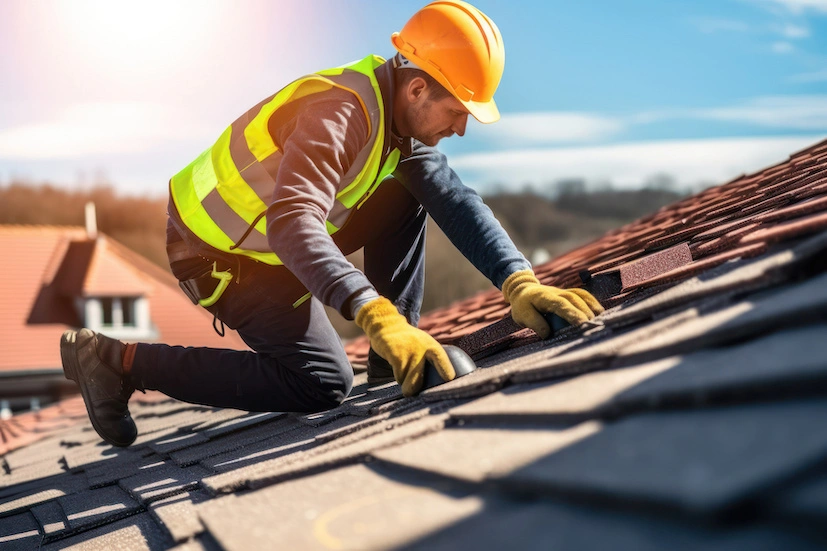Tile Roof Repair & Replacement Palm Beach County

Palm Beach County homeowners trust SK Quality Roofing Inc for specialized tile roof repair and replacement services. As a leading tile roof repair and replacement company in the region, we expertly handle cracked or broken tiles, flashing repairs, and other tile roofing concerns. Our commitment to quality workmanship keeps your roof safe and visually appealing. Call SK Quality Roofing Inc at (561) 276 8040 to schedule a free consultation and experience trusted tile roof repair and replacement in Palm Beach County.
Comparing Clay and Concrete Roof Tiles for Homes in Palm Beach County
Choosing the right roofing material is one of the most important decisions a Florida homeowner can make. In Palm Beach County, where sun, wind, rain, and salt air all take a toll, your roof needs to do more than just look good. It needs to last. Two popular choices for long-lasting roofs in this region are clay tiles and concrete tiles. Both are durable and attractive, but each performs differently under Florida’s unique conditions.
If you’re deciding between these two options for a new roof or a replacement, here’s what you need to know to make an informed decision.
Understanding The Materials
Clay tiles have been used for centuries. Made from natural clay and fired at high temperatures, they are known for their rich color and long lifespan. These tiles are often associated with Mediterranean or Spanish-style homes and hold up well in hot climates.
Concrete tiles, on the other hand, are made from a mixture of cement, sand, and water. They can mimic the appearance of clay, slate, or even wood shake, making them versatile from a design perspective. Concrete tiles are generally more affordable but heavier than clay.
Now let’s break down how each type performs in the real world, especially under Florida’s demanding weather patterns.
Durability In Heat And Humidity
Both materials are designed for hot climates, but clay has a slight edge when it comes to handling extreme heat. Clay tiles resist UV rays naturally and don’t fade as quickly. They also retain their color longer without additional treatments. In Palm Beach County, where the sun can beat down relentlessly for most of the year, clay tiles are less likely to show long-term damage from sunlight.
Concrete tiles are also heat-resistant, but their color may fade over time unless sealed or coated. The surface can also absorb more moisture in Florida’s humid conditions, which may lead to mildew or moss buildup if not cleaned regularly.
Weight And Roof Structure
Weight is a big factor that often gets overlooked. Clay tiles are lighter than concrete, which puts less stress on the roof structure. This matters if your home was not originally built to support a heavy roofing material. In contrast, concrete tiles are significantly heavier and may require additional reinforcement before installation.
If your home in Palm Beach County was designed with tile roofing in mind, either option may be suitable. But for homes transitioning from a lighter material like shingles, clay could be the safer, less invasive choice.
Impact Resistance And Wind Performance
Florida roofs need to withstand more than just sun and humidity—they must also endure hurricanes and strong storms. When installed correctly, both clay and concrete tiles can meet Miami-Dade wind uplift standards, which are among the toughest in the country.
Concrete tiles are typically considered more impact-resistant due to their density. They may perform better during hail or when debris is blown onto the roof during a storm. Clay tiles are more brittle and may crack under impact, although modern manufacturing processes have improved their durability.
It’s worth noting that regardless of material, proper installation is key. Tiles that are not anchored correctly will fail in strong winds, no matter how durable they are individually.
Maintenance Requirements
Both materials are relatively low maintenance compared to options like shingles or metal. However, concrete tiles can develop algae, especially in damp, shaded areas. Regular cleaning and occasional sealing may be needed to keep them looking good.
Clay tiles resist mold and mildew better, thanks to their smoother surface and lower water absorption rate. They’re also less likely to warp or degrade over time. That said, they are more fragile when walked on, so inspections and repairs should always be handled by a professional.
Aesthetic Appeal
This is where personal preference comes into play. Clay tiles offer a more traditional look and tend to have richer, natural tones. They age well and develop character over time, which many homeowners appreciate.
Concrete tiles come in a wider variety of shapes, styles, and colors. If you’re looking for a customized appearance or a tile that mimics another material, concrete gives you more options. Both can enhance curb appeal, but the visual difference may matter more if you’re concerned about architectural consistency or HOA requirements.
Cost Considerations
Concrete tiles are usually more budget-friendly upfront. The lower price point can make them appealing for homeowners looking for a long-lasting material without stretching the budget. Clay tiles, while more expensive, tend to have a longer lifespan and may require fewer repairs over time.
When comparing total cost, it’s important to factor in long-term maintenance, energy efficiency, and replacement cycles. A clay tile roof may cost more initially, but if it lasts decades longer with fewer issues, it could be the better investment.
Lifespan And Warranty
Clay tiles can last 50 years or more with proper care. In some cases, they can last over a century. Concrete tiles have a lifespan of 30 to 50 years. Manufacturer warranties will vary, but clay tiles often come with longer coverage, reflecting their ability to endure time and weather.
For homeowners in Palm Beach County who plan to stay in their home for decades, clay tiles may offer better peace of mind. For those focused on immediate return or resale value, concrete might be a better fit.
Which Is Best?
There’s no one-size-fits-all answer. Both clay and concrete tiles perform well in Florida’s climate, but they serve different needs.
Choose clay tiles if:
- You want a long-lasting roof with minimal fading
- Your home has a lighter roof structure
- You prefer traditional Mediterranean aesthetics
- You’re investing for the long term
Choose concrete tiles if:
- You need a more affordable tile option
- You want more flexibility in color and design
- You’re concerned about impact resistance
- You’re planning to sell within 10–15 years
Talk To A Local Expert Before Making A Final Decision
Tile roofs are a significant investment, and the best way to choose the right material is to get a professional opinion. A licensed roofing contractor in Palm Beach County can inspect your current roof, evaluate the structure, and help you weigh the pros and cons of each tile type based on your goals.
Both clay and concrete tiles offer lasting protection and beauty. The right choice depends on your home’s needs, your aesthetic preferences, and your long-term plans. Whichever you choose, proper installation and maintenance are essential to getting the most from your tile roof in Florida’s demanding environment.
Professional Tile Roof Repair and Replacement Company Serving Palm Beach County
SK Quality Roofing Inc is a leading tile roof repair and replacement company dedicated to helping Palm Beach County homeowners preserve their tile roofs’ strength and beauty. Our skilled team handles repairs carefully to protect your home from leaks and further damage caused by broken or displaced tiles. Choose a company with local experience and a commitment to quality. Call SK Quality Roofing Inc at (561) 276 8040 for a free consultation and reliable tile roof repair and replacement services tailored to Palm Beach County homes.
